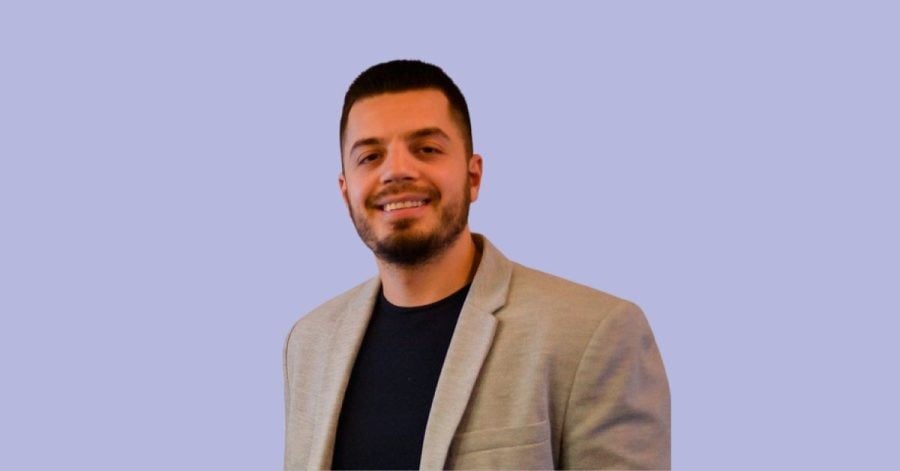Thirty-three-year-old Ervin Kalemi was always interested in software development, and less in entrepreneurship. However, it was precisely software development that led him to become an entrepreneur.
While he first started to build websites for other clients, Kalemi quickly realized that this wasn’t what he wanted to do – he aspired to create something on his own, and something that users themselves would enjoy.
So, Kalemi took the first step by founding the social media management platform Publer, which has grown to be one of Albania’s most successful startups to date, with more than 150 thousand users on board.
What Publer does is that it helps businesses, freelancers, entrepreneurs, small-to-medium enterprises build their presence on Facebook, Instagram, and Twitter among other social media channels, and spread the word about their work and efforts.
Bootstrapping its way through and facing a lot of challenges during its growth phase, next week Publer is launching on Product Hunt, aiming to reach an ever bigger community.
As Kalemi explains, the many ups and downs during the journey are also a testimony to the harsh reality and toughness of Albania’s startup ecosystem.
After graduating in the US, Kalemi always had plans to come back to his native Albania and start his businesses in the country. While he founded Publer in 2012, two years ago Kalemi also had another startup called Kibo – a unified inbox for emails and messages.
In an interview for The Recursive, Kalemi reflects on his path from a software developer to an entrepreneur, the difficulties of scaling out of Albania, as well as his expectations for what lies ahead for the startup ecosystems in the Western Balkans.
The Recursive: How did you discover your role as an entrepreneur in Albania?
Ervin Kalemi: I graduated from the University of Texas, at Austin, back in 2012. During my last year of college, I liked web development and started learning on my own how to build websites, and how to do web design.
Initially, I started creating websites for other clients. At the beginning I had only one client, so I built their website. Then later on, they kept asking me: “Hey, can you make this small change?” It was very time-consuming and I realized that I don’t want to do that anymore.
Instead, what I enjoyed the most is building solutions that many customers can use. And if they like it, they simply use it – if they don’t like it, they can go with a competitor, or they can leave it there.
Publer isn’t my first project. I started with several projects before Publer, they’re no longer working at the moment, but they showed me the path that I wanted to follow.
After graduation, I started working full-time for a software development company. In parallel I realized that I enjoyed working on Publer much more than I did at my current job. Even though it was the same thing – I was building software.
With Publer I was able to build software that the customers enjoyed the most, or at least I was getting that feedback. And for the other company, I was simply building the software for the company, and I didn’t know whether the users were enjoying it.
So this is how my entrepreneurial journey started. It was definitely a coincidence, I didn’t plan to become an entrepreneur. I just enjoyed building software that other people could use.
Could you take us through Publer’s journey, how did it come to be, and its growth over the years?
It has had its ups and downs like every business. And I think that in the tech industry the ups and downs are definitely more visible. For example, in 2018 Publer almost went bankrupt because of the issues that Facebook had with the Cambridge Analytica scandal.
Back then, they decided to block all third-party apps until they manually reviewed every one of them. This review process took six months for us, and during that period we weren’t able to offer our services for Facebook and eventually lost half of our customers if not all of the customers, because they went with a competitor like Buffer.
Then, from 2018 I would say that we have seen steady growth. We launched on AppSumo, which is a deal site and this basically gave us a boost in terms of brand awareness and providing a monthly recurring revenue.
So if we’re popular now, this is because of the deal that we had with AppSumo. They advertised Publer to their audience, which has a million subscribers. And in exchange, we offered a lifetime deal for these subscribers.
We have thousands of their users on Publer that are taking advantage of a lifetime deal. On the other hand, they are spreading the word about us, and that has helped us get more actual paying customers.
Next week, we’re also launching on Product Hunt. It’s not similar to AppSumo, but it’s as famous and we expect good feedback from there.
How do you see the rise of the Albanian startup ecosystem? How have you seen it develop together with your company over the years?
There has been development and growth, but not at the speed that I would prefer. It’s very slow, and I think one of the main reasons is that software development companies here are focused more on outsourcing.
They develop products for clients, and not trying to build their own products. I know it’s tough, because I’ve done it myself. It’s been 10 years working on Publer already, and I’d say that 10 years is a very long time for a company to grow. Butwith Publer we don’t have to wait for projects to come in because we already have one and keep improving its features and services.
I think the slow progress is also due to the fact that there’s not too much money being invested in software development companies. For example Publer is 100% bootstrapped, it didn’t receive any funding, not even grants from the government or from other companies here in Albania.
I think that companies abroad don’t have this problem, because there’s plenty of money that is being invested.
I’d prefer product companies to build products that are scalable worldwide, because there are no limitations. Here in Albania, we have the food delivery company Baboon, which is very famous. At the same time there are two other competitors also showing up on the market.
There are too many food delivery apps, and it’s not like Albania has a big population for this many competitors. We have to be more creative and try not to copy each other’s products that are only used locally. We’re only going to hurt ourselves.
What would you say are the key strengths, but also weaknesses when we are talking about Albania and its founders?
Our biggest strength is that we are very determined. Maybe it comes from our culture, we don’t give up too easily. Our weaknesses are maybe the lack of funding and lack of networking.
For example, we want to be partners with Facebook to get more exposure. Our competitors such as Buffer and Hootsuite partnered with Facebook, and most likely they knew someone from Facebook and took advantage of their connection.
This is something that I cannot do from Albania, because Facebook and all the other companies don’t have headquarters in Albania or in any country that is near here.
We are also lacking an example to get inspiration from. When I was studying in the US and was about to graduate from school, I wanted to work for Facebook, Amazon or Google, because they were and still are the biggest tech companies in the US.
In Albania, we don’t have a very big tech company that students can get inspired from, so we don’t have an example to follow. We have to follow examples from outside of Albania, but they arefrom a different culture, different country with different outcomes.
What is the potential of the whole region of the Western Balkans to grow and develop?
It has great potential because the cost to develop software is much lower here than if you were to be building it outside the region. If I had to build it in the US, I wouldn’t have been able to because the living costs and salaries there are very high.
In the US or even Europe, it’s impossible to build software only by bootstrapping. You’d have to receive funding for that. In the Balkans, because the living costs and salaries are much lower, you are able to bootstrap your product, which is the best thing to do because you’re 100% in control of the company.
And it gives you stability because when you get too much cash, most of the time you’re not spending it wisely. But if you’re limited in terms of cash and you spend it more wisely, you have steady growth.
So there’s potential in the region as long as companies focus on developing their own solutions.
What are your goals for 2023?
For next year, I want to focus more on my second startup called Kibo. Kibo is a unified inbox for email and messages that you receive on social media. It will help businesses respond to customers, regardless if the customer is contacting them on social media, email, or messaging apps.
I started Kibo last year, and I was trying to manage a project at the same time, but I learned that it’s impossible. I was failing at both of them at the same time because I didn’t have the time to manage them.
So I decided that for 2022, I was only going to focus on Publer, suspend the Kibo project and maybe resume it at a later date.
Right now Publer is more mature, since we have more than 150 thousand users on board. Now it’s safe to at least try to bring Kibo back online.
What is your advice for young and upcoming entrepreneurs from Albania and the region?
My advice for young entrepreneurs would just be to start now, since that’s the hardest part. If you don’t start, then you’re not going to go anywhere. Whether it’s learning a new programming language, or trying to start a project, you have to start even if it is simple, you have to do it.
When I compare how Publer was 10 years ago, the landing page, the features, and everything, I cannot believe how much it has progressed over the years. But the thing is that it progressed because I did have the courage to start, and also the persistence to keep going. So these are the two main things – you have to start and you have to have the persistence to keep going.








